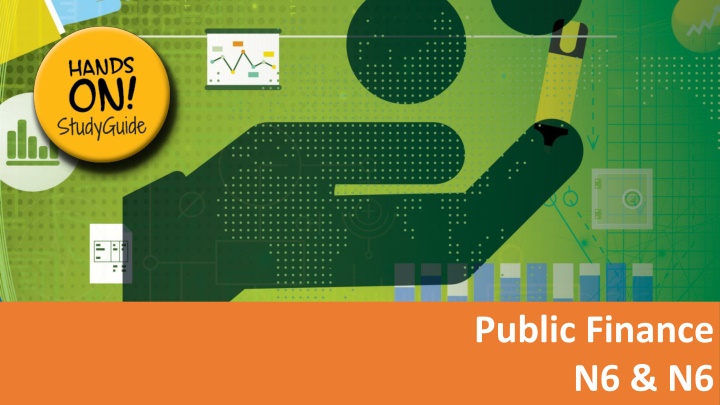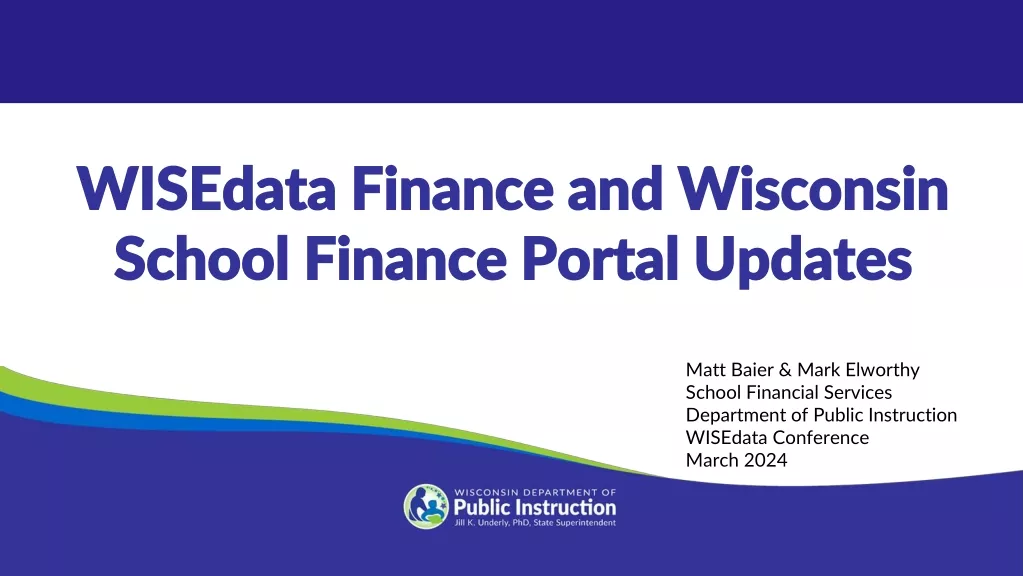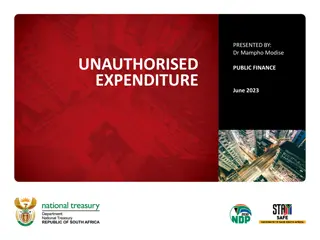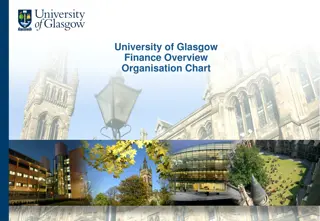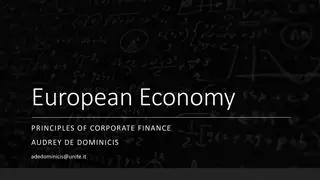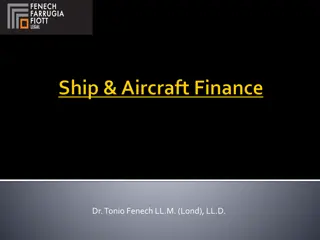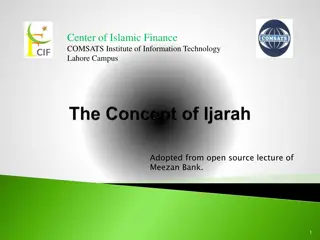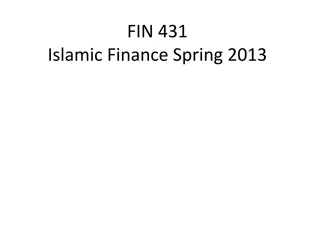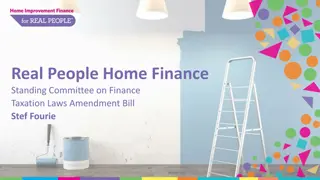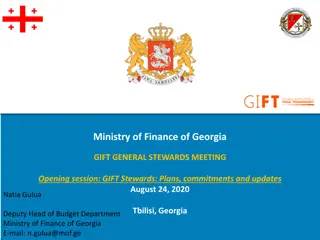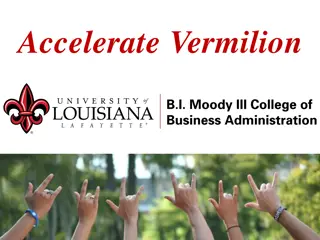Fundamental Principles of Public Finance
Public Financial Management involves the management of public funds, focusing on goals, objectives, and ideologies shaping government functions. Concepts such as laissez-faire and socialism influence how governments provide services, enforce laws, protect private interests, and promote social welfare.
Download Presentation

Please find below an Image/Link to download the presentation.
The content on the website is provided AS IS for your information and personal use only. It may not be sold, licensed, or shared on other websites without obtaining consent from the author.If you encounter any issues during the download, it is possible that the publisher has removed the file from their server.
You are allowed to download the files provided on this website for personal or commercial use, subject to the condition that they are used lawfully. All files are the property of their respective owners.
The content on the website is provided AS IS for your information and personal use only. It may not be sold, licensed, or shared on other websites without obtaining consent from the author.
E N D
Presentation Transcript
Public Finance N6 & N6
N5 Module 1 Fundamental Principles of Public Finance INTRODUCTION Public Financial Management is concerned with the management of public funds or money. www.futuremanagers.com
N5 Module 1 Fundamental Principles of Public Finance (continued) GOALS AND OBJECTIVES OF GOVERNMENTS All governments are striving towards the realisation of goals. When setting goals, a governement will consider their ideology and the following: The needs of the community; The functions by which they strive to realise their goals; The nature of public services rendered in order to fulfil their functions; The sources of income from which public services could be financed; and The administration and control of such income. www.futuremanagers.com
N5 Module 1 Fundamental Principles of Public Finance (continued) LAISSEZ-FAIRE Laissez-faire is French and it means to allow to do . In this ideology, the government does not intervene in the private economy/social activities of individual citizens or groups instead it allows a system of free association with what is today called free market principles. www.futuremanagers.com
N5 Module 1 Fundamental Principles of Public Finance (continued) GOALS OF THE LAISSEZ-FAIRE SYSTEM Maintenance of law and order (protection services); Enforcement of contracts by law courts (legal protection); Protection of private lives; Protection of private property (legal/social protection); and Defence of national community against any enemy (protection services). www.futuremanagers.com
N5 Module 1 Fundamental Principles of Public Finance (continued) SOCIAL WELFARE GOALS An ideology of socialism arose in which governments were asked to create circumstances within which individuals could develop his/her social welfare and physical being . This led to socialism which was based on the idea that governments were expected to deliver things such as better working conditions, better pay and more protection. www.futuremanagers.com
N5 Module 1 Fundamental Principles of Public Finance (continued) SOCIALISM (OR COMMUNISM) Socialism is accepted as a system of statism with centrally concentrated and comprehensive economic/social/physical control of the activities of the individual to the detriment of individual liberty, where the ownership of all the factors of production are vested in the government, and where production, distribution and trade belong to the community and are administered by the government on behalf of the community. www.futuremanagers.com
N5 Module 1 Fundamental Principles of Public Finance (continued) THE IDEALOGY OF SOCIALISM Socialism advocates the transformation of private property into public property and income provided from such property to be divided in accordance with individual needs. This amounts to the common ownership of all the means of production. www.futuremanagers.com
N5 Module 1 Fundamental Principles of Public Finance (continued) THE 10 COMMANDMENTS OF SOCIALISM 1. The abolition of property rights for land and utilisation of all income from rents for public purposes; 2. Abolition of all inheritance rights; 3. Confiscation of all property of immigrants and rebels; 4. Centralisation of credit in the hands of the state; 5. A heavy progressive or graduated income tax; 6. Centralisation of the means of communication and transport to the state; 7. Extension of factories and instruments of production owned by the state; 8. Equal obligation on all to work; 9. Integration of agriculture with manufacturing industries; 10. Free education for all children in public schools. www.futuremanagers.com
N5 Module 1 Fundamental Principles of Public Finance (continued) CHARACTERISTICS OF SOCIALISM It does not acknowledge private ownership of production factors; Government decides on how production factors shall be employed; There is a ban on all capitalist or free market systems; Redistribution of income takes place through severe use of taxation; Social security benefits are collectively provided for out of progressive tax sources to uplift less privileged classes; and Government guarantees a minimum standard of living. www.futuremanagers.com
N5 Module 1 Fundamental Principles of Public Finance (continued) SOCIAL WELFARE STATE Nations and communities began to seek for some balance between the extremes: the laissez-faire where the rich got richer and the most entrepreneurial took all, with little or no protection of the less privileged; and socialism where all remained poor and people had no freedom to decide for themselves. This resulted in the modern social welfare state. www.futuremanagers.com
N5 Module 1 Fundamental Principles of Public Finance (continued) ECONOMIC WELFARE STATE AS AN IDEOLOGY A modern democracy might lean either towards a laissez-faire or towards a more socialist approach, but in general it attempts to: Recognise the individual as important; Recognise the state as the servant of the individual who needs to be assisted in general and personal self-actualisation; Practise a free-market system with intervention only when necessary; Create a system which protects the rights of all. www.futuremanagers.com
N5 Module 1 Fundamental Principles of Public Finance (continued) GOVERNMENT FUNCTIONS AND PUBLIC SERVICES In order to realise their goals, governments have to execute a number of functions. Generally these functions are classified as: Line functions vertical programme subdivisions, and Staff functions horizontal supporting services. www.futuremanagers.com
N5 Module 1 Fundamental Principles of Public Finance (continued) LINE FUNCTIONS: VERTICAL Most authorities recognise the following three types of Government Functions: 1. Order and Protection Police and Defence 2. Social or National Welfare Health, education, pensions, etc. 3. Economic Welfare Stimulation of the economy using fiscal (tax) and monetary control (interest rates). www.futuremanagers.com
N5 Module 1 Fundamental Principles of Public Finance (continued) STAFF FUNCTIONS OR SERVICES: HORIZONTAL These are supporting functions, contributing to the line functions, in order to realise the goals of the government of the day. Typical services provided by people in various positions in offices throughout the country include: Financial services; Personnel services; Office and secretarial service; and Legal advisory service. www.futuremanagers.com
N5 Module 1 Fundamental Principles of Public Finance (continued) CLASSIFICATION OF GOVERNMENT SERVICES Generally speaking we look at and classify three different types of services to members of the public: 1. Social/Collective or Public Services; 2. Specific/Particular Services; 3. Quasi-Social or Quasi-Particular Services. www.futuremanagers.com
N5 Module 1 Fundamental Principles of Public Finance (continued) PRIVATISATION OF GOVERNMENT SERVICES If a government leans more towards a modern, democratic and capitalist society, it will probably seek privatisation of national assets. For example, it might seem logical that many citizens might want to nationalise industries, such as the gold mines. www.futuremanagers.com
N5 Module 1 Fundamental Principles of Public Finance (continued) REASONS FOR PRIVATISATION The main goal of privatisation is the restructuring and rationalisation of a country s economy. This could happen for the following reasons: To encourage a policy of private initiative within a market related economy; To reduce excessive government spending; To lower the financial burden of government; and To increase the tax base. www.futuremanagers.com
N5 Module 1 Fundamental Principles of Public Finance (continued) METHODS OF PRIVATISATION Contracting out allowing private individuals to supply services; Deregulation taking away legal/monetary obstacles so that an industry has no protection against competition from others; Depoliticisation divorcing or separating important services from party politics. www.futuremanagers.com
N5 Module 2 Guidelines for a Democratic Financial System ORIGIN OF DEMOCRACY Aristotle, a Greek philosopher, came up with the idea of democracy in 384- 322 BC. www.futuremanagers.com
N5 Module 2 Guidelines for a Democratic Financial System (continued) THE MAGNA CARTA This document depicted the Constitutional relationship between the King, the Common Council and the citizens of England and was signed by King John of England in 1215. www.futuremanagers.com
N5 Module 2 Guidelines for a Democratic Financial System (continued) THE AMERICAN WAR OF INDEPENDENCE The British government expected the people of America to pay them taxes without giving them any representation in the British Parliament. The American colonists were deeply unhappy about this and this led to the American War of Independence. www.futuremanagers.com
N5 Module 2 Guidelines for a Democratic Financial System (continued) THE FRENCH REVOLUTION The French Revolution was the first largescale revolution during which the royal family and the aristocracy of France were executed and a democratically styled government was put in their place. Since then the modern world, and other communities, have sought to fight for a model which closely resembled the one fought for in France. www.futuremanagers.com
N5 Module 2 Guidelines for a Democratic Financial System (continued) 10 DEMOCRATIC PRINCIPLES FOR PUBLIC FINANCIAL MANAGEMENT 1. No tax can be collected from taxpayers without their consent; 2. Utilisation of public financial resources must satisfy the collective needs; 3. Participatory democracy means direct participation by the taxpayers; 4. Public financial decision-making should be; 5. Only elected political representatives has the authority to introduce taxes; 6. Responsibility of the elected political representatives is owed to taxpayers; 7. Political representatives must be sensitive to the needs of the community; 8. The budget programmes should satisfy the needs of the public; 9. Social equity or justice requires integrity; 10. Activities regarding public financial management must take place in public. www.futuremanagers.com
N5 Module 2 Guidelines for a Democratic Financial System (continued) ACCOUNTABILITY Each political representative should give full account of his/her activities. In a democracy officials and representatives are called upon to be accountable for the efficient and effective use of public funds. www.futuremanagers.com
N5 Module 2 Guidelines for a Democratic Financial System (continued) ACCOUNTING Accounting is the mechanism through which representatives can be accountable to the public at the end of the financial year a report on the financial effects of each department s activities is compiled. www.futuremanagers.com
N5 Module 2 Guidelines for a Democratic Financial System (continued) FINANCIAL DECISION MAKING IN A PARTICIPATORY DEMOCRACY Most modern governments attempt to implement at least some of the principles of participatory democracy into their ideology; this is done through public meetings, especially on financial matters. www.futuremanagers.com
N5 Module 2 Guidelines for a Democratic Financial System (continued) REPRESENTATIVES VERSUS VOTERS Representatives are chosen to speak, to make decisions on behalf of their voters direct participation is difficult and expensive as there are too many voters; the representative therefore participates on behalf of the voter. www.futuremanagers.com
N5 Module 3 Role of the Central Government in the Financing of Public Institutions THE LEGISLATURE The legislature is a selected body of people given the power and responsibility to make laws for the nation. www.futuremanagers.com
N5 Module 3 Role of the Central Government in the Financing of Public Institutions (continued) PARLIAMENT Parliament comprises the elected representatives of the people. The government is accountable to Parliament. In terms of the Constitution, Parliament could pass a vote of no confidence in the cabinet, including the President. Parliament also has to decide how to allocate the taxpayers money to provide services for the people. www.futuremanagers.com
N5 Module 3 Role of the Central Government in the Financing of Public Institutions (continued) CABINET The cabinet consists of the President, as head of the cabinet, the Deputy President and ministers. The President appoints the Deputy President and ministers, from among the members of the National Assembly with no more than two ministers from outside the assembly. www.futuremanagers.com
N5 Module 3 Role of the Central Government in the Financing of Public Institutions (continued) PARLIAMENT: THE PEOPLE DECIDE A parliamentary democracy means that every citizen of voting age has the opportunity to influence the manner in which the country is governed. This means that, although not every citizen is physically making a decision, the people are electing the candidates that they think will make the best decisions for them. www.futuremanagers.com
N5 Module 3 Role of the Central Government in the Financing of Public Institutions (continued) THE POWER AND AUTHORITY RELATIONSHIP Power is the ability of an individual, interest group or the government to exert influence over another. In politics, authority is the power given to representatives and government to act on behalf of their voters. In this way the authority itself is supported by the power given to the government by the voters themselves. www.futuremanagers.com
N5 Module 3 Role of the Central Government in the Financing of Public Institutions (continued) VOTERS AND THE LEGISLATURE The power which the voter holds is given to a government or representatives in an election during which various parties and individuals present a manifesto to the public. In a democracy the real power is vested in the voter, while the authority over public finance rests with the elected representatives within The Legislature. www.futuremanagers.com
N5 Module 3 Role of the Central Government in the Financing of Public Institutions (continued) INTEREST GROUPS AND THE LEGISLATURE An interest group is formed when a number of people feel strongly about something and wants to make a change. Voters may combine their strength and put pressure on the government to do something very often this is called a pressure group. Interest groups are a communication channel or link between individual voters and the government. www.futuremanagers.com
N5 Module 3 Role of the Central Government in the Financing of Public Institutions (continued) THE IMPOSITION OF TAX Only The Legislature may impose tax and it also allocates the funds that arise from taxation. The Legislature may delegate taxing authority to: The Legislature at regional level (provincial councils); The Legislature at local government level (town councils). www.futuremanagers.com
N5 Module 3 Role of the Central Government in the Financing of Public Institutions (continued) THE ALLOCATION OF FUNDS The ultimate authority to allocate funds must undoubtedly rest with The Legislature. When funds are allocated, values are taken away from one group and given to another group. www.futuremanagers.com
N5 Module 3 Role of the Central Government in the Financing of Public Institutions (continued) FUNCTIONS OF THE NATIONAL BUDGET Budgets need to be very carefully planned and presented and the total income the state enjoys should be fairly and carefully distributed. www.futuremanagers.com
N5 Module 3 Role of the Central Government in the Financing of Public Institutions (continued) REDISTRIBUTION OF WEALTH The aim of the redistribution of wealth is to bridge a gap which might have emerged from an imbalance in wealth of poverty. One way to resolve this is to tax the wealthy and allot monetary value to the poor. This comes with its own set of issues, however and can lead to dissatisfaction. www.futuremanagers.com
N5 Module 3 Role of the Central Government in the Financing of Public Institutions (continued) THE AUDITOR GENERAL The Auditor-General is empowered to determine the way in which the executive authority executes the management of public funds. The person who holds this office will audit the financial statements of all Accounting Officers at national, provincial and local levels. www.futuremanagers.com
N5 Module 3 Role of the Central Government in the Financing of Public Institutions (continued) PUBLIC ACCOUNTS COMMITTEE Once the Auditor-General s report has been submitted The Legislature needs to interpret its findings and act upon its recommendations. Few members of Parliament have the expertise to do this instead they refer the report to a standing committee the Public Accounts Committee. www.futuremanagers.com
N5 Module 3 Role of the Central Government in the Financing of Public Institutions (continued) THE PUBLIC PROTECTOR The public protector exists to protect the ordinary citizen.The Public Protector: May summon any person or legal body to give evidence; May enter any premises and demand the handing over of all records and documents for investigation; May initiate an investigation by himself, without a public complaint; Is protected from any insult or slander by any member of the public. www.futuremanagers.com
N5 Module 3 Role of the Central Government in the Financing of Public Institutions (continued) THE ROLE OF THE EXECUTIVE AUTHORITY The task of the executive authority is to control and co-ordinate all activities related to state spending.In our country, the executive authority is represented, at central government level by the cabinet and at local government level, by a committee. www.futuremanagers.com
N5 Module 3 Role of the Central Government in the Financing of Public Institutions (continued) AT PROVINCIAL LEVEL The executive council consists of the Premier as head of the council and no less than five and no more than ten members appointed by the Premier. www.futuremanagers.com
N5 Module 3 Role of the Central Government in the Financing of Public Institutions (continued) AT LOCAL GOVERNMENTAL LEVEL The finance committee has the same responsibilities and functions on local government level as the cabinet does in the central government. However, the committee may be dismissed by the local legislature and the principle of individual and collective responsibility and accountability applies here as it does at central government level. www.futuremanagers.com
N5 Module 3 Role of the Central Government in the Financing of Public Institutions (continued) CHAIRMAN OF THE FINANCIAL COMMITTEE The chairperson of the finance committee is called upon to account for the proposals, recommendations and financial activities of the committee. They are expected to adopt and encourage good communication channels between the finance committee itself and all the other committees, and should be in a position to exert influence on the chairperson and to persuade them to adopt the recommendations of the finance committee. www.futuremanagers.com
N5 Module 3 Role of the Central Government in the Financing of Public Institutions (continued) THE FUNCTIONS OF THE TREASURY The Treasury has the power to disapprove of any proposed (ex-anti) expenditure by any given department should this not be properly motivated. The Treasury plays a vital role in ensuring that the financial policy is correctly interpreted and effectively and efficiently executed. www.futuremanagers.com
N5 Module 3 Role of the Central Government in the Financing of Public Institutions (continued) THE ROLE/FUNCTION OF THE ADMINISTRATIVE AUTHORITY When we speak of an administrative body in government we refer to various departments. They are created and run in order to provide the citizens of SA with certain essential and important services, for example: Department of Agriculture, Forestry & Fisheries; Department of Arts & Culture; Department of Basic Education; and the Department of Communications. www.futuremanagers.com
N5 Module 3 Role of the Central Government in the Financing of Public Institutions (continued) FINANCIAL CONTROL WITHIN THE ADMINISTRATIVE AUTHORITY There are different members of authority who have control or influence on the finances, namely: The Minister; The Auditor-General; The Accounting Officers; and The Departmental Financial Officers. www.futuremanagers.com
N5 Module 4 The Generation of Income and the Expenditure within a State ALLOCATION AND EXPENDITURE OF INCOME INCOME OF CENTRAL GOVERNMENT Every government must have a particular ideology which will determine not only how it will govern its people, but also how it will allocate taxing authority at various levels those levels being central, provincial and local. The various levels of government should logically supplement each other in a reasonable way this means that the money they collect through taxes and the services they provide should not overlap. www.futuremanagers.com
